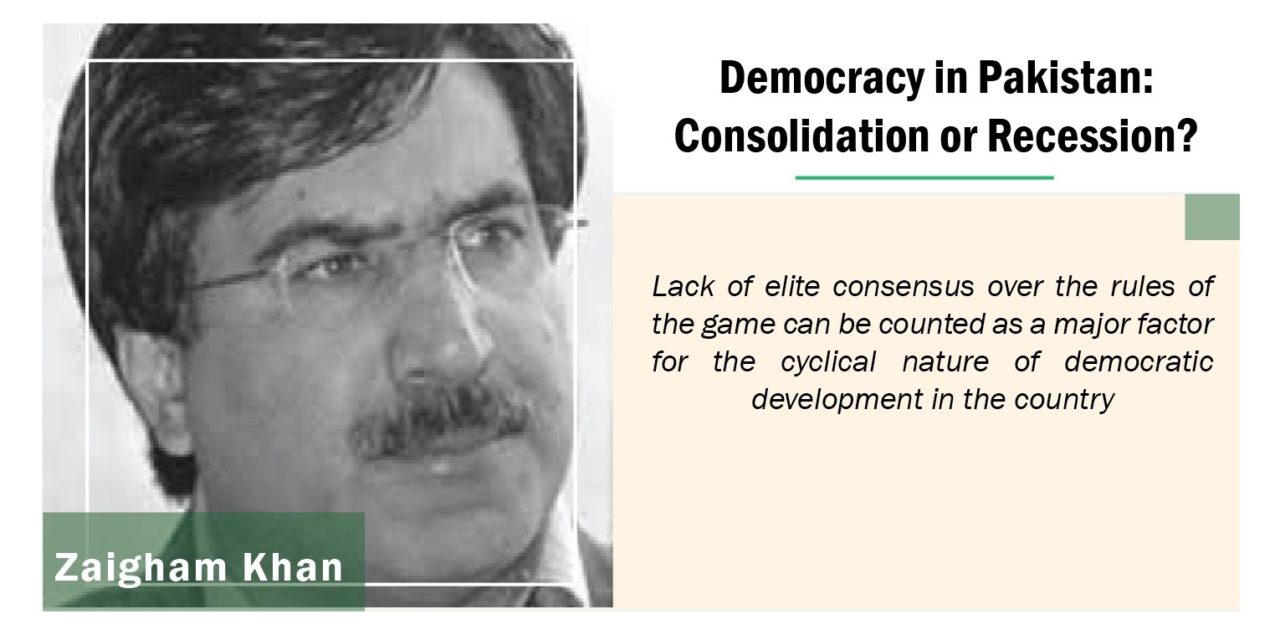Two years ago, Pakistan completed a decade of democracy after returning to a democratic set up in 2008. For the second time in our history, a democratic period had lasted for a decade. In that year Pakistan also passed Huntington’s ‘two turnover test’. According to this test, if a new democracy survives two turnovers of power, then it has consolidated satisfactorily. For the first time in our history, two democratic governments had completed their tenures in succession, though the tenures of two prime ministers were cut short through judicial action.
Theoretically, there was a lot to feel optimistic. Many people feel democracy works like an escalator. Once we get on it, it goes up and up. In democracy studies, it is called the transition paradigm. At one time, this framework was so popular that some termed it ‘transitology’. Transitology is based on the belief that “any country moving away from dictatorial rule can be considered a country in transition toward democracy.”
However, for more than a decade, many leading political scientist have raised serious doubts about the transition paradigm. This is how Larry Diamond, a leading scholar in democracy studies and his colleagues argued in a journal article: “If a country is not yet democratic, we cannot be sure that it will become such; therefore it is not right to say it is ‘in transition to’ democracy. If it has already become democratic, then of course it is no longer in transition. Therefore, transition can only be known ex post facto. Until we know the end result, it is safer to speak simply of open-ended political change.”
When these developments happened, the country no purposeful process was happening in which democratic forms could be turned into democratic substance. Institutional reform had been stalled and the conflict between elected and non-elected institutions had created a logjam in the system, not only stalling the democratic progress but also creating a wider instability that was pulling down economic development. Civil society was shrinking into oblivion, facing an onslaught from the uncivil society. Rather than consolidating the democratic rules of the game, parties had reneged on earlier agreements made for the purpose.
During the last two years, the democratic horizon has become bleaker. Many democratic gains, achieved in the earlier years of “transition” have been lost. Many reasons can be ascribed for the democratic recession in Pakistan. Lack of elite consensus over the rules of the game can be counted as a major factor for the cyclical nature of democratic development in the country.
Steven Levitsky and Daniel Ziblatt, two Harvard professors, have come up with some interesting arguments about the erosion of democracy in recent times in their influential book ‘How Democracies Die’. They argue that political norms are as important to democracy as rules and laws. They outline two crucially important norms: “mutual toleration or the understanding that competing parties accept one another as legitimate rivals, and forbearance, or the idea that politicians should exercise restraint in deploying their institutional prerogative”.
Pakistan’s two most important political parties had reached the same conclusion when they signed the Charter of Democracy in 2006. No amount of wisdom could have foreseen the eruption of a populist party on the scene that would declare such a deal as muk mukao (a self-serving insidious deal)
Despite all setbacks and difficulties, both the PPP and PML-N stuck to democratic norms till 2013. Their legislative achievements during the period will remain unparalleled for a long time to come. The 2013 elections started the Trumpian era in Pakistan – an era defined by PTI’s politics. As conflicts erupted some important parts of the Charter remained unimplemented — and the new political player, the PTI rejected the charter altogether.
Huntington puts his faith in elections for consolidation of democracy and the dawn of a new democratic era for a nation. In fact, elections can be deeply polarizing if cohesive bargains are not made between the elites. Elections do not provide a substitute to such a bargain.
No wonder then that for the fourth time in Pakistan’s history, a ruling political party is making a concerted effort to establish single-party hegemony, using similar tools and techniques. Will the PTI succeed where the PPP in 1970s and three Muslim Leagues in 1990s and 2000s failed miserably, inflicting grievous harm on themselves, the democratic order and society in the process?


